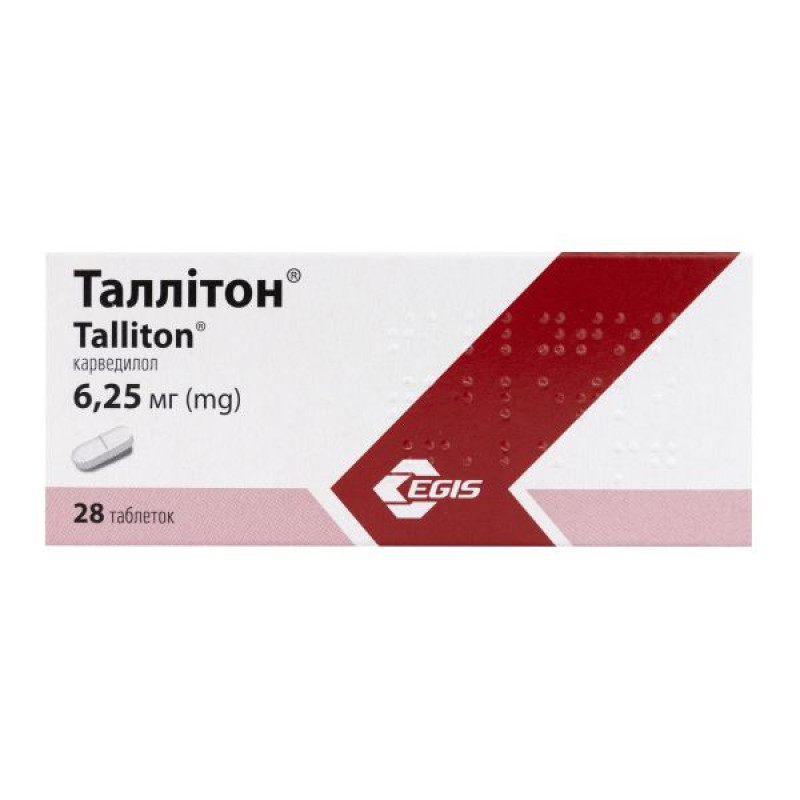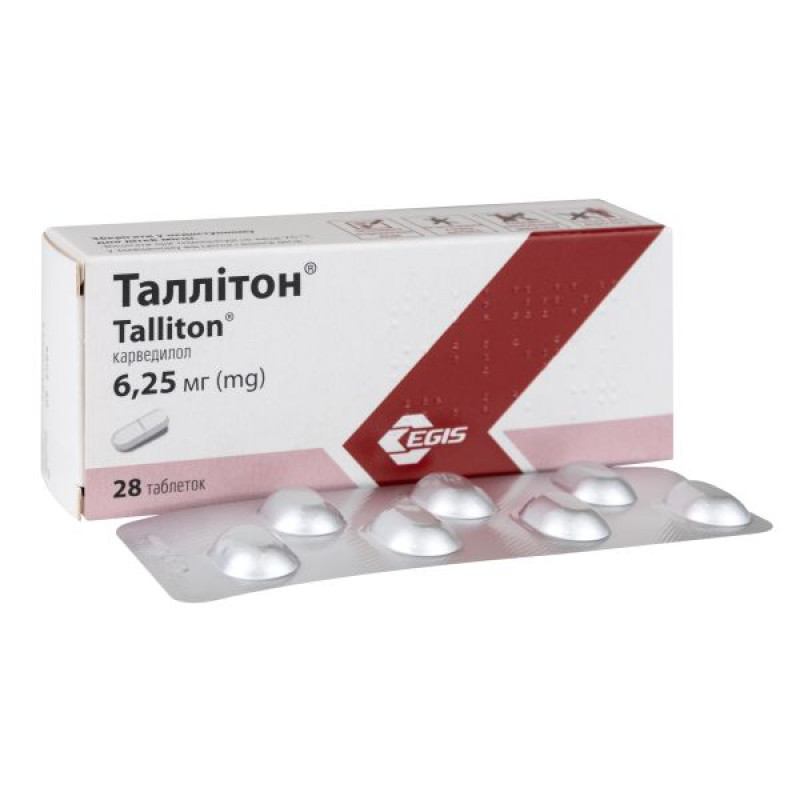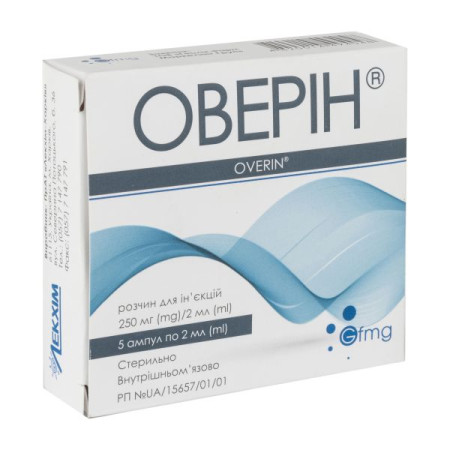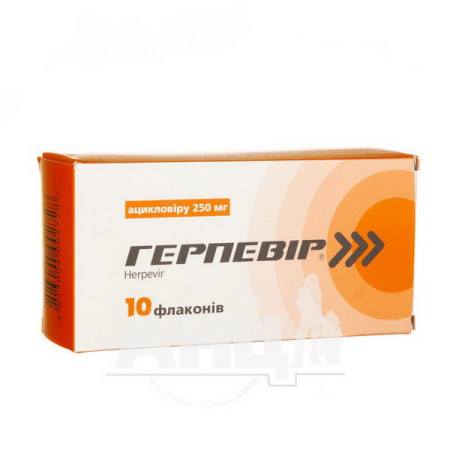Talliton tablets 6.25 mg blister No. 28
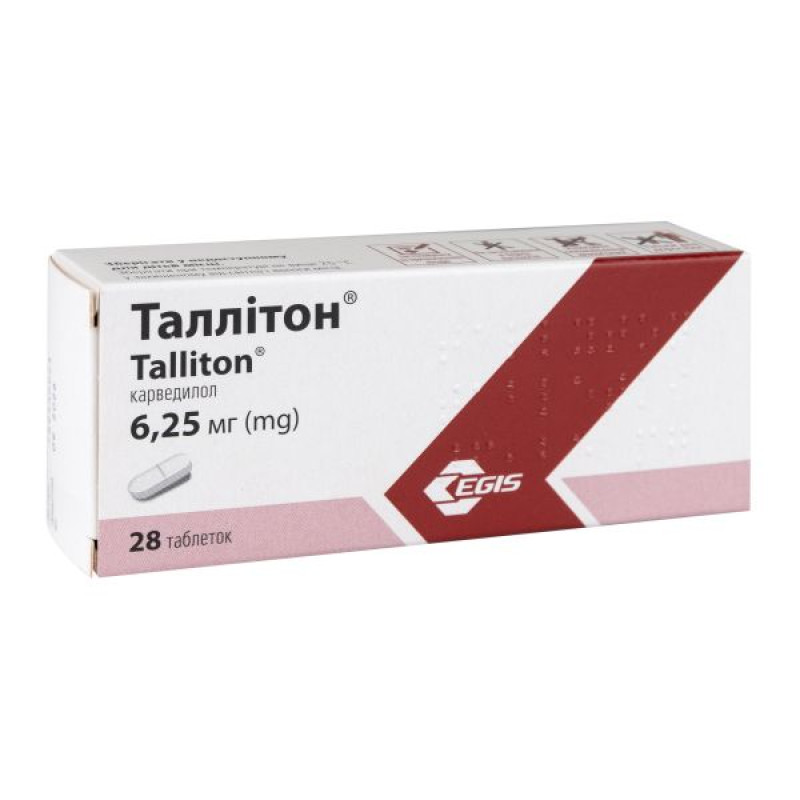
Pharmacological properties
Tallito belongs to non-selective β-adrenergic receptor blockers, has vasodilator properties (due to α1-adrenergic blockers), and exhibits antioxidant activity.
As a vasodilator, Talliton reduces peripheral vascular resistance and also inhibits the renin-angiotensin-aldosterone system. The antihypertensive effect develops quickly - 2-3 hours after a single dose and lasts 24 hours. The maximum effect is observed after 3-4 weeks of daily administration of the drug.
Rapidly absorbed in the gastrointestinal tract after oral administration. The maximum concentration in blood plasma is reached after 1 hour. In elderly patients, the concentration of carvedilol in blood plasma is 50% higher than in young people. Bioavailability is 25%. In cirrhosis of the liver, the bioavailability of carvedilol increases 4 times, and the maximum concentration in blood plasma is 5 times. Concomitant food intake does not affect the bioavailability of the drug and increases the time to reach its maximum concentration in the blood. Binding to blood proteins is 98-99%. It is intensively metabolized in the liver by the formation of glucuronides. Dimethylation and hydroxylation of the phenyl ring lead to the formation of 3 active metabolites with β-adrenoblocking activity. The average half-life of carvedilol is 6-10 hours, blood plasma clearance is about 590 ml/min.
It is eliminated mainly with bile and feces. It is practically not removed from the blood during hemodialysis.
Indication
Essential hypertension, coronary artery disease, stable angina, chronic heart failure in adults in combination with diuretics, digoxin or ACE inhibitors.
Application
The tablets are taken orally, swallowed whole and washed down with sufficient liquid.
Essential hypertension: the recommended initial dose is 12.5 mg of Talliton once a day for 2 days (1 tablet of 12.5 mg in the morning) or 1 tablet of 6.25 mg 2 times a day (morning and evening). The recommended maintenance daily dose is 25 mg of Talliton (1 tablet of 25 mg in the morning or 1 tablet of 12.5 mg 2 times a day - morning and evening).
In case of unsatisfactory results, but not earlier than the 14th day of treatment, the dose may be increased to a maximum of 50 mg/day (1 tablet of 25 mg 2 times a day in the morning and evening). The maximum single dose is 25 mg, the daily dose should not exceed 50 mg.
Stable angina: the recommended initial dose is 12.5 mg 2 times a day (morning and evening) for the first 2 days. The recommended maintenance dose is 25 mg 2 times a day (morning and evening). In case of unsatisfactory effect, but not earlier than the 14th day of treatment, the dose can be increased to the maximum - 50 mg 2 times a day (2 tablets of 25 mg in the morning and evening).
Chronic heart failure: the dose should be selected individually, careful monitoring should be carried out during the dose increase. It is necessary to observe the patient's condition for 2-3 hours after the first dose of the drug or after the first dose increase.
The recommended initial dose is 3.125 mg 2 times a day for 14 days (1/2 tablet of 6.25 mg in the morning and evening). If the patient tolerates the treatment well, the dose can be increased to 6.25 mg 2 times a day (1 tablet of 6.25 mg in the morning and evening). The dose can be further increased to 12.5 mg 2 times a day (1 tablet of 12.5 mg in the morning and evening), then to 25 mg 2 times a day (1 tablet of 25 mg in the morning and evening). The target maximum recommended dose is 25 mg 2 times a day (1 tablet of 25 mg in the morning and evening) for patients weighing up to 85 kg and 50 mg 2 times a day (2 tablets of 25 mg in the morning and evening) for patients weighing more than 85 kg.
At the beginning of treatment, the patient's condition should be monitored, as worsening of heart failure symptoms is possible. Hypotension and weakness may develop. In case of decompensation of heart failure, the dose of diuretics is increased, and a temporary reduction in the dose of Talliton may be required. In some cases, treatment with Talliton should be temporarily discontinued.
Contraindication
Hypersensitivity to the ingredients of the drug; decompensated heart failure; sick sinus syndrome, conduction disorders (sinoatrial, AV block II-III degree), except for patients with an artificial pacemaker; bradycardia (heart rate 50 beats / min); arterial hypotension (systolic blood pressure 85 mm Hg); cardiogenic shock; cor pulmonale, pulmonary hypertension; liver failure; pheochromocytoma (except for conditions stabilized by the use of α-adrenoceptor blockers); BA, bronchospastic syndrome; metabolic acidosis; pregnancy and breastfeeding; age up to 18 years.
Side effects
From the side of the central nervous system: headache, drowsiness, fatigue, rarely - depression, sleep disorders, paresthesia.
Cardiovascular system: orthostatic hypotension, bradycardia, hypotension, syncope, angina attacks, peripheral circulatory disorders (cold extremities), intermittent claudication or Raynaud's syndrome, peripheral edema, atrioventricular block, worsening of heart failure symptoms.
Respiratory system: shortness of breath, asthma, rarely - nasal congestion.
From the gastrointestinal tract: nausea, diarrhea, abdominal pain, rarely - constipation, vomiting.
Skin: allergic exanthema, urticaria, itching; very rarely - anaphylactoid reactions, psoriasis.
Others: rarely - pain in the extremities, decreased potency, decreased tear production, visual impairment, eye irritation, dry mouth, urination disorders, chills.
Special instructions
Particular attention should be paid to patients with labile or secondary atrial fibrillation; complete right bundle branch block, in the presence of bradycardia; acute myocarditis; severe peripheral circulatory disorders, as well as patients receiving α1-blockers or α2-adrenomimetics.
Patients with severe heart failure, electrolyte imbalance, low blood pressure or the elderly should be under close medical supervision for 2 hours after taking the first increased dose due to the risk of developing a sudden decrease in blood pressure, orthostatic hypotension and syncope. The risk of these complications can be reduced by using the drug in a low initial dose and taking it with food.
The dose of the drug should be reduced if the patient has bradycardia (heart rate 55 beats / min).
Particular caution should be exercised when prescribing carvedilol to individuals receiving cardiac glycosides, diuretics and/or ACE inhibitors for heart failure.
Patients with heart failure, whose initial systolic blood pressure is 100 mm Hg. Art., and in the presence of concomitant diseases - coronary artery disease, peripheral vascular disease or impaired renal function, should check the function of the urinary system more often, since treatment may affect renal function. If a decrease in renal function is noted, the dose of Talliton should be reduced or treatment should be discontinued.
In individuals with Prinzmetal's angina, nonselective β-blockers may provoke chest pain. The use of the drug for unstable angina, as well as for first-degree atrioventricular block, requires constant medical supervision, monitoring, and frequent ECG recording.
Treatment of patients with peripheral arterial disease, diabetes mellitus, and hyperthyroidism should be carried out with caution, under constant medical supervision.
Treatment with Talliton in patients with psoriasis requires an assessment of the risk/benefit ratio of treatment, as carvedilol may aggravate the disease or provoke the appearance of its symptoms. Treatment should be discontinued gradually, by reducing the dose, to prevent withdrawal syndrome.
Treatment of patients with diagnosed pheochromocytoma is not recommended before appropriate therapeutic blockade with α-adrenergic blockers. Patients who wear contact lenses should be warned that carvedilol reduces the production of tear fluid.
The use of Talliton is contraindicated during pregnancy and breastfeeding.
During treatment with Talliton (especially at the beginning of treatment and when increasing the dose), it is not recommended to drive vehicles and perform work that requires increased attention and speed of psychomotor reactions.
Drinking alcoholic beverages is also not recommended.
Interactions
Caution should be exercised when used simultaneously with:
reserpine, MAO inhibitors, as they can cause the development of severe bradycardia and hypotension;
digoxin - slows down atrioventricular conduction and heart rate;
calcium channel blockers (verapamil, diltiazem) and antiarrhythmics (especially class 1), as they can provoke severe arterial hypotension and heart failure;
with insulin and oral hypoglycemic agents - enhancing the effect of hypoglycemic agents and masking the symptoms of hypoglycemia;
antihypertensive agents (clonidine, guanethidine, α-methyldopa, guanfacine) due to potentiation of the hypotensive effect and a decrease in heart rate;
anesthetics - due to their negative inotropic effect and hypotensive effect;
with drugs that affect the central nervous system (hypnotics, tranquilizers, tricyclic antidepressants and ethyl alcohol), due to the possibility of mutual enhancement of effects;
NSAIDs - due to a decrease in hypotensive effect due to a decrease in prostaglandin production;
α- and β-adrenergic agonists due to mutual antagonism of action;
ergotamine - it is necessary to take into account the vasoconstrictor effect of ergotamine;
xanthine derivatives (aminophylline, theophylline) - reduce the antihypertensive effect of Talliton;
rifampicin (since carvedilol undergoes oxidative metabolism, its pharmacokinetics may change upon induction or inhibition of the cytochrome P450 enzyme system. Therefore, the mutual influence of rifampicin should be taken into account - there is a decrease in the concentration of carvedilol in the blood serum by 70%);
barbiturates - reduce the effect of carvedilol;
cimetidine - increases the bioavailability of carvedilol by 30%;
digoxin - the concentration of digoxin in the blood plasma increases;
CYP 2D6 isoenzyme inhibitors (quinidine, fluoxetine, paroxetine, propafenone) - an increase in the concentration of the R (+) enantiomer of carvedilol can be assumed;
cyclosporine - carvedilol slows down the metabolism of cyclosporine.
Overdose
Treatment: gastric lavage or use of emetics, if their use is possible within several hours after taking the drug. Intensive care is necessary. The patient should be given a horizontal position with the lower extremities raised. The antidote to β-adrenergic blocking effects is orciprenaline or isoprenaline: 0.5-1 mg i / v and / or glucagon at a dose of 1-5 mg (maximum dose - 10 mg).
In case of severe arterial hypotension, adrenaline is parenterally re-administered at a dose of 5-10 mcg (or its intravenous infusion is carried out at a rate of 5 mcg/min).
For the treatment of severe bradycardia, atropine is administered intravenously at a dose of 0.5-2 mg. To maintain cardiac activity: glucagon 1-10 mg intravenously quickly, infusion duration - 30 s, after which a constant long-term infusion is carried out at the rate of 2-5 mg / h.
If the peripheral vasodilatory effect prevails (warm extremities, in addition to significant hypotension), it is necessary to prescribe norepinephrine in repeated doses of 5-10 mcg intravenously or as an infusion - 5 mcg/min.
To relieve bronchospasm, β-adrenomimetics (in the form of an aerosol or intravenously) or aminophylline intravenously are prescribed.
In case of convulsions, slow intravenous administration of diazepam or clonazepam is recommended.
In severe cases of intoxication, when symptoms of shock dominate, treatment should be carried out until the patient's condition stabilizes, taking into account the half-life of carvedilol (6-10 hours).
Storage conditions
In a dry place, protected from light, at a temperature of 15-25 °C.
There are no reviews for this product.
There are no reviews for this product, be the first to leave your review.
No questions about this product, be the first and ask your question.







